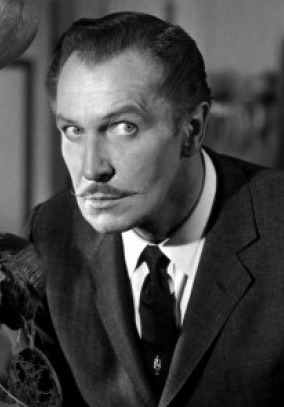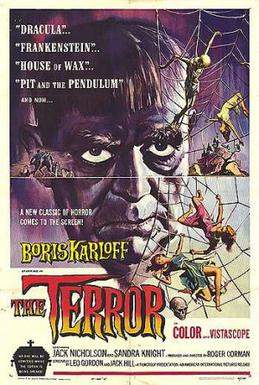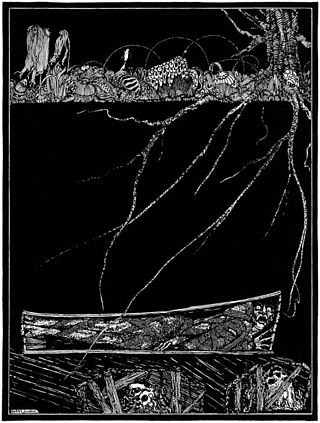See also
- Le Corbeau (The Raven), a 1943 French noir film starring Pierre Fresnay and Ginette Leclerc
- Raven (disambiguation)
" The Raven " is a narrative poem by Edgar Allan Poe.
The Raven may also refer to:
Nemesis is a Greek mythological spirit of divine retribution against those who succumb to hubris. Nemesis may also refer to:

"The Black Cat" is a short story by American writer Edgar Allan Poe. It was first published in the August 19, 1843, edition of The Saturday Evening Post. In the story, an unnamed narrator has a strong affection for pets until he perversely turns to abusing them. His favorite, a pet black cat, bites him one night and the narrator punishes it by cutting its eye out and then hanging it from a tree. The home burns down but one remaining wall shows a burned outline of a cat hanging from a noose. He soon finds another black cat, similar to the first except for a white mark on its chest, but he develops a hatred for it as well. He attempts to kill the cat with an axe but his wife stops him; instead, the narrator murders his wife. He conceals the body behind a brick wall in his basement. The police soon come and, after the narrator's tapping on the wall is met with a shrieking sound, they find not only the wife's corpse but also the black cat that had been accidentally walled in with the body and alerted them with its cry.

"The Pit and the Pendulum" is a short story by American writer Edgar Allan Poe and first published in 1842 in the literary annual The Gift: A Christmas and New Year's Present for 1843. The story is about the torments endured by a prisoner of the Spanish Inquisition, though Poe skews historical facts. The narrator of the story describes his experience of being tortured. The story is especially effective at inspiring fear in the reader because of its heavy focus on the senses, such as sound, emphasizing its reality, unlike many of Poe's stories which are aided by the supernatural. The traditional elements established in popular horror tales at the time are followed, but critical reception has been mixed. The tale has been adapted to film several times.

William Henry Pratt, known professionally as Boris Karloff and occasionally billed as Karloff the Uncanny, was an English actor. His portrayal of Frankenstein's monster in the horror film Frankenstein (1931), his 82nd film, established him as a horror icon, and he reprised the role for the sequels Bride of Frankenstein (1935) and Son of Frankenstein (1939). He also appeared as Imhotep in The Mummy (1932), and voiced the Grinch in, as well as narrating, the animated television special of Dr. Seuss' How the Grinch Stole Christmas! (1966), which won him a Grammy Award.

Vincent Leonard Price Jr. was an American actor. He was known for his work in the horror film genre, mostly portraying villains. He appeared on stage, television, and radio, and in more than 100 films. Price has two stars on the Hollywood Walk of Fame, one for motion pictures and one for television.

The Raven is a 1963 American comedy gothic horror film produced and directed by Roger Corman. The film stars Vincent Price, Peter Lorre, and Boris Karloff as a trio of rival sorcerers. The supporting cast includes Jack Nicholson as the son of Lorre's character.
Thriller may refer to:

"Treehouse of Horror" is the third episode of the second season of the American animated television series The Simpsons. It originally aired on Fox in the United States on October 25, 1990. The episode was inspired by 1950s horror comics, and begins with a disclaimer that it may be too scary for children. It is the first Treehouse of Horror episode. These episodes do not obey the show's rule of realism and are not treated as canon. The opening disclaimer and a panning shot through a cemetery with humorous tombstones were features that were used sporadically in the Treehouse of Horror series and eventually dropped. This is also the first episode to have the music composed by Alf Clausen.

The Black Cat is a 1934 American pre-Code horror film directed by Edgar G. Ulmer and starring Boris Karloff and Béla Lugosi. It was Universal Pictures' biggest box office hit of the year, and was the first of eight films to feature both Karloff and Lugosi. In 1941, Lugosi appeared in a comedy horror mystery film with the same title, which was also named after and ostensibly "suggested by" Edgar Allan Poe's short story.

Hazel Court was an English actress. She is known for her roles in British and American horror films during the 1950s and early 1960s, including Terence Fisher's The Curse of Frankenstein (1957) and The Man Who Could Cheat Death (1959) for Hammer Film Productions, and three of Roger Corman's adaptations of Edgar Allan Poe stories for American International Pictures: The Premature Burial (1962), The Raven (1963) and The Masque of the Red Death (1964).
A juggernaut is an unstoppable force.
A demon is a malevolent supernatural being in religion, occultism, mythology, folklore, and fiction.

The Terror is a 1963 American independent horror film produced and directed by Roger Corman. The film stars Boris Karloff and Jack Nicholson, the latter of whom portrays a French officer who is seduced by a woman who is also a shapeshifting devil.

"The Premature Burial" is a horror short story by American writer Edgar Allan Poe, published in 1844 in The Philadelphia Dollar Newspaper. Its main character expresses concern about being buried alive. This fear was common in this period and Poe was taking advantage of the public interest. The story has been adapted to a film.

The Raven is a 1935 American horror film directed by Louis Friedlander and starring Boris Karloff and Béla Lugosi. Billed as having been "suggested by" Edgar Allan Poe's 1845 poem of the same title, excerpts of which are quoted at a few points in the film, it was adapted from an original screenplay by David Boehm. Lugosi stars as a neurosurgeon obsessed with Poe who has a torture chamber in his basement, and Karloff plays an escaped murderer on the run from the police who Lugosi manipulates into doing his dirty work.

Edgar Allan Poe's poem "The Raven" has been frequently referenced and parodied in contemporary culture. Immediately popular after the poem's publication in 1845, it quickly became a cultural phenomenon. Some consider it the best poem ever written. As such, modern references to the poem continue to appear in popular culture.

American poet and short story writer Edgar Allan Poe has had significant influence in television and film. Many are adaptations of Poe's work, others merely reference it.

Edgar Allan Poe has appeared in popular culture as a character in books, comics, film, and other media. Besides his works, the legend of Poe himself has fascinated people for generations. His appearances in popular culture often envision him as a sort of "mad genius" or "tormented artist", exploiting his personal struggles. Many depictions of Poe interweave elements of his life with his works, in part due to Poe's frequent use of first-person narrators, suggesting an erroneous assumption that Poe and his characters are identical.

The Raven is a stylized silent 1915 American biographical film of Edgar Allan Poe starring Henry B. Walthall as Poe. The film was written and directed by Charles Brabin from a 1904 play and 1909 novel by George C. Hazelton.
The Tell-Tale Heart is an 1843 short story by Edgar Allan Poe.